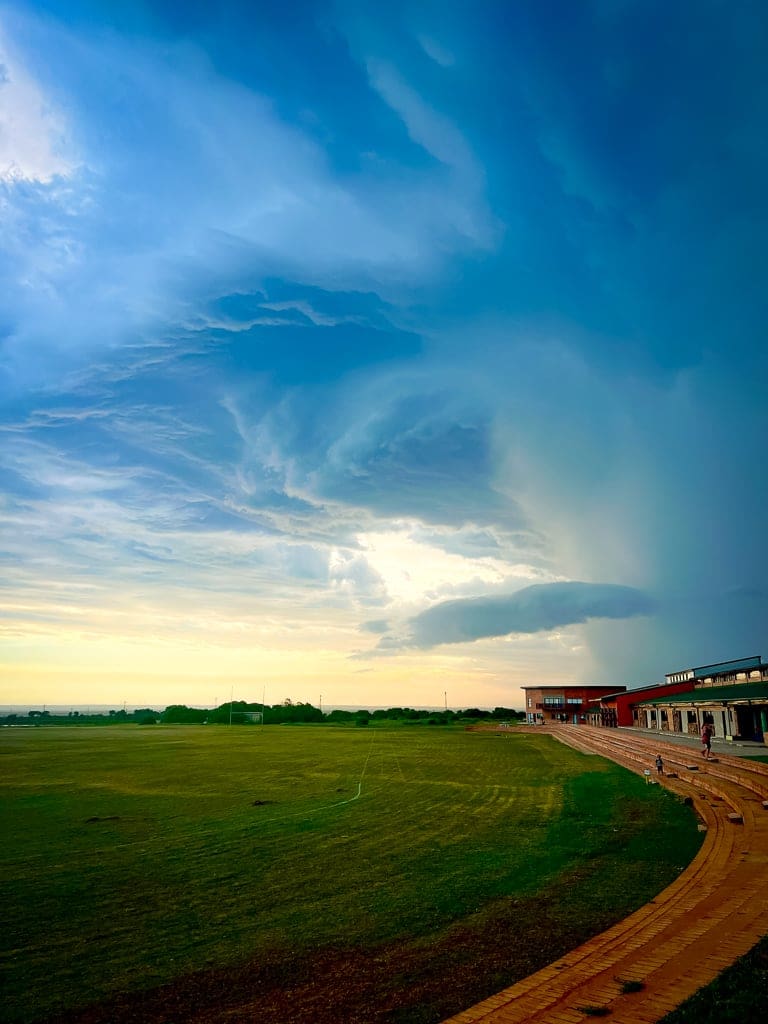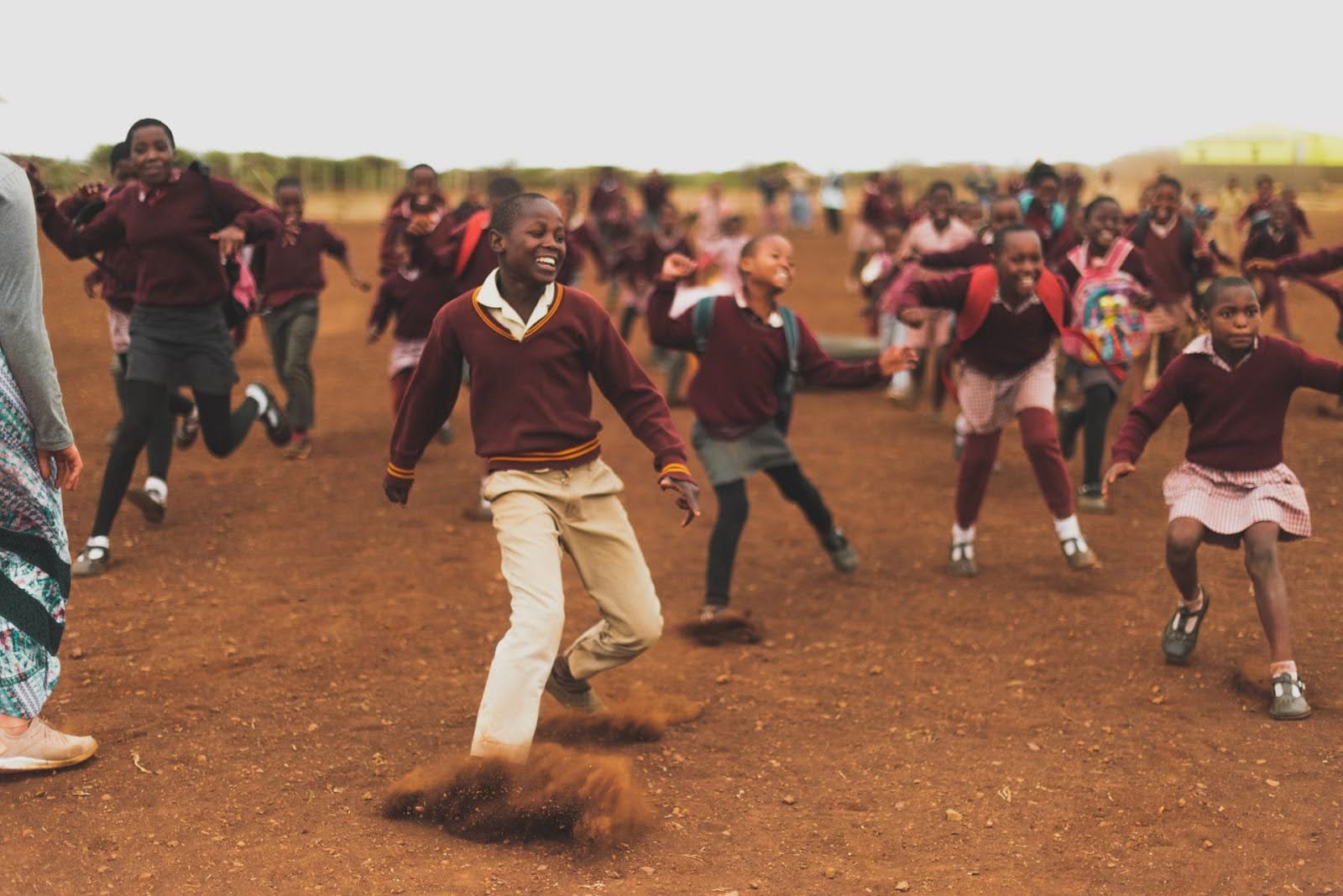In the middle of Granada, Nicaragua, just past the town's central park, lies a row of restaurants and cafes, souvenir shops and ice cream parlors. It's touristy, a place where all the foreigners can be found at any given time of day and where many of the locals go to sell their wares.
It's also the prime spot for the homeless community. As soon as you walk through that part of town, you can expect to be solicited by both vendors selling goods and impoverished people who are desperate for anything you're willing to give.
The first time I found myself in the touristy part of Granada, I became captivated by a little boy who was extraordinarily persistent in asking for money. He continued following my group, and my friend Casey and I decided to use it as an opportunity to minister to the child.
Neither of us felt comfortable giving him money—glue-sniffing is a problem in Nicaragua, especially among street children—so I said I'd buy him food instead. He then led us to a fast food place called Tip-Top, which is essentially Nicaragua's answer to Chik Fil A. There, Casey and I prayed for the boy, told him about Jesus, and I taught him a few lines from the song “Clama a Mi” while he ate his chicken burger and fries.
This was not an unusual occurrence. My squad was in Granada for debrief, and several people started initiatives to help the homeless community there. My former teammate Lesa collected fruit and bread to hand out, my squad mate Isaiah collected clothes, and Casey organized a prayer and food outreach.
Our squad had a hyper-awareness of the poverty plaguing this little tourist town. Any time we went near centro (the town's center, which included restaurant row—also known as Gringo Alley), we knew to expect just about anything. But what happened to me during our second-to-last night there was totally and completely unexpected.
That's because nothing like this has ever happened to me before. Ever.
I've had a heart for the homeless since I was a child. When I was seven, I became irrationally upset on my way home from school one day because I saw a man with a sign that said WILL WORK FOR FOOD. I cried and cried until my grandma turned the car around and went back to give him two dollars.
In high school, various friends and I would gather food, collect old clothes, and go drive around downtown San Antonio late at night, looking for homeless people to help. We were fond of one lady in particular and would buy her breakfast tacos from a 24-hour taco place.
I was only 16 at that time—pretty young to be doing that kind of thing after nightfall. But I never really saw many homeless people during the day, and as a result, these turned into (very) late night excursions...usually around 2:00 am and later.
I wasn't supposed to be out that late, by the way. In my mom's defense, I was extremely rebellious back then, and she honestly probably thought I was sound asleep at a friend's house.
Despite how dangerous all of this may sound, I actually never encountered a problem or threat of any kind. And after I was born again last year, I felt convicted to begin serving and ministering to the homeless community of San Antonio regularly. I did everything from handing out shirts/food/Bibles to giving homeless people lifts around town.
Again, that probably sounds dangerous, but I never encountered any major threats while working in this impromptu ministry (only one time did I feel anxious about giving someone a lift—you can read about that here).
Before Granada, I figured I'd seen most everything there is to see in homeless ministry. I might've even laughed if you'd told me homeless ministry was dangerous. But then danger—a real-life, no-joke kind of danger—happened our second-to-last night of debrief.
My new teammate Cathy and I decided to go to Gringo Alley in the evening. She was looking for earrings, and I was looking for a Cross necklace. We had a worship session and talks at eight o'clock, which gave us about an hour to kill before we had to head back to the hostel.
About halfway through Gringo Alley, we saw a man using fire for a special type of street art. Cathy wanted to check it out, so we stopped to watch and ended up chatting with a local. I felt the Gospel on my lips, as if it were ready to burst out of me, so I suggested to Cathy (who's fluent in Spanish) that she share the Good News. She did, and she and the man entered into a conversation.
As they were talking, another man came up and asked for money. He was in bad shape, his eyes bloodshot, his clothes shabby and unkempt. “Hey. Hey, wherrrre you from?” he slurred. His English was pretty good aside from the slurring—he was intoxicated, I could tell—and then I remembered that I'd already met him once before. It was our first day in Granada, the day my friend Casey and I fed and prayed for that little boy.
This man—his name is Juan—had been panhandling that day, too. Amidst asking us for money, he'd told us he was from Puerto Rico and that he grew up in the US (Los Angeles, to be exact—that's where he learned English). His wife was Nicaraguan, and that's how he ended up in Granada.
He went through the same routine, telling me his story and how he really needed money. I had a little cash on me, but I felt the Holy Spirit prompting me to pray for him instead. Juan said okay, so I closed my eyes and started praying—nothing fancy, just a prayer that God would send someone to buy him a meal.
As I was praying, Juan began to cry.
Ohhh, boy, I thought. Holy Spirit is on the move! And that's when I realized why the Gospel had been so heavy on my heart just moments before. The Holy Spirit was leading Juan to me and (simultaneously) prepping me to share the Gospel with him!
God's efficiency and ingenuity never cease to amaze me.
Knowing my Pappa the way I do, I could tell God was after Juan, that He'd been pursuing him and was about to save his soul. All the signs were there. All the puzzle pieces were matched up. Whatever the man's circumstances, whatever his afflictions—whatever obstacles or strongholds or chasms were standing in the way of him and God—this was a moment of harvest.
So I shared the Gospel with Juan. After, I asked if he wanted to receive Jesus as his Lord and Savior. His expression turned somber. He looked at me dead on then burst into tears. “I'm scared of Jesus!” he cried out.
“Oh.” The outburst was so shocking it rocked me back a step. “Oh, no. Juan, you don't understand. Jesus is wonderful. He's so gentle and kind—He sent you to me.” I caressed his back tenderly, trying to sooth him. “That's why you came and talked to me. He led you over here. He loves you.”
Juan wept. “No one loves me,” he mumbled. “Look! I-I don't even have shoes!”
I looked down. Sure enough, he had one foot squeezed into a ratty old dress shoe while his other foot was bare, not even a sock to cover it.
“Aw, it's okay. I know where I can get you a pair of shoes.” I smiled, thinking of my old running shoes. They were pretty worn, but they'd at least be something to keep his feet protected from the elements. “Why don't you come with us? I'll give you the shoes, and I'll try to get you some food and money, too. Okay?”
He nodded. I thought he was about to say thank you, but then he told me something that disturbed me beyond belief:
“The devil came to me when I was sleeping," he said. "It was a dream, and he—” He paused, face twisting in fear. Then he burst into tears again. “He said I'm going to hell!”
“That's a lie,” I said sharply. “Don't you believe that, Juan. Don't you dare believe that.” I tried to get him to look at me. “Jesus has a place for you in Heaven. All you have to do is believe.”
“I'm scared of Jesus!” He continued to cry as he explained how he'd been living in a cemetery outside of town and how the devil had been invading his dreams, scaring him to death, and telling him lies about Jesus. “He said I'm never going to Heaven,” he sobbed. “There's th-things in that cemetery. They come out at night...I'm sc-scared of them. They're going to kill me, but I—I don't wanna die!”
I frowned. This poor man was being tormented by demonic strongholds. That's what was really going on. No wonder he was so frightened.
“Insanity, I bind you in the name of Jesus. Alcohol, I bind you in the name of Jesus. Addiction, lies...I bind you in the name of Jesus, for whatever I bind on earth is bound in heaven.” I spoke the declarations aloud, binding any and all demons Holy Spirit prompted me to bind. Juan didn't seem to notice. He was either too drunk or too deep in bondage to realize what I was doing.
But the strongholds that had taken over this poor man knew exactly what I was doing. And they were about to call in reinforcements.
After I shared a little more about Jesus, Juan, still fighting tears, agreed to ask Christ into his heart. Standing face to face with him, I took one of his hands and began the repeat-after-me prayer. We were more than halfway through when suddenly a man stormed over to us and punched Juan in the chest.
Juan stood frozen, stunned by the impact. My jaw slipped, my mouth sliding open in shock. Cathy spun around, confused.
“Cathy?” I couldn't understand what the man was yelling about—he said something about paragua—and I was hoping she'd translate.
“I don't—” Words evaded my teammate, who was standing with her ear tilted toward the man as if trying to catch what he was saying. It seemed like she wanted to step in -- like she at least wanted to speak up -- but the guy wasn't messing around, and we knew it.
Before we could do anything else -- before we could even blink -- he grabbed hold of Juan and shoved him. I gasped. “Pare!” I demanded (parar is Spanish for “stop”), but the man paid no attention to me. Juan didn't say a word as the guy manhandled him, lifting up his shirt, checking his pockets.
“What's he doing?” I finally blurted at Cathy.
“I—” She eyed the guy, still perplexed. “He wants his umbrella.”
“His...umbrella?” A swift shake of my head. Why would this guy get so violent over an umbrella? Juan clearly didn't have anything in his pockets—no money, no wallet. Certainly not an umbrella.
It's because he was about to receive Christ.
The realization shook my spirit. Looking back, I'm sure it was the Holy Spirit who revealed that, and it does make sense. I mean, what are the chances that, right as Juan was about to receive Christ, some guy would randomly (and violently) come charging up to get (of all things) an umbrella?
The guy finished searching Juan's pockets and came up empty-handed. Clearly frustrated, he grabbed Juan by the collar and raised his fist again.
“No!” I had a hold of Juan's hand. Tightening my grip, I pulled him close. The enemy might be able to bully Juan, but I wasn't going to let him bully me. I was not letting go of this man until he received the salvation God had for him.
My close proximity didn't faze the the assailant. Neither did the crowd of spectators gathering around us. The man slammed his fist into Juan's chest again. Again. I jumped, startled with each impact—like a large book being dropped on a table, or a door being slammed in a quiet room.
This guy wasn't going to stop. Juan was in trouble, and I might be too.
That's when I started to pray.
“Holy Spirit, take over. Take over this situation.” Another hit. I had to stifle a scream but managed to squeak out Jesus' name. “Make him go away,” I whispered, eyes pinched shut. “Please, Pappa. Please.”
And that's exactly what Jesus did. It was weird—as suddenly as the guy showed up, he just as suddenly gritted his teeth, did a 180, and stormed off.
Praise God, for He is a mighty Fortress and my Shelter.
“Juan?” I didn't realize I was holding my breath. As I spoke Juan's name, relief rushed out of me like a leaky balloon. “Hey. Oh my goodness, did he hurt you?”
“No.” Juan's shoulders drooped, his head hung in shame. “I—I could have fought him," he said, tone dull, “but I didn't want to.”
“Sure you could have.” I forced a smile. “Let's finish the prayer, all right? We're almost done, then Cathy and I are going to get you some shoes and food.”
So we finished the repeat-after-me prayer—Juan officially received Jesus as his Lord and Savior—and then we walked him to our hostel. Within fifteen minutes, he had a pair of shoes, socks, bananas, crackers, some money, and about ten World Racers praying over him and declaring Truth in the name of Jesus.
My squad mate Liv prophesied sobriety over him. Casey spoke powerfully in his prayer language. Several people offered words of love and encouragement.
We did this for about half-an-hour before our squad mentor Greg called us inside. “Session's starting, guys,” he said. “Everyone inside.”
The rest of the group trickled in. I wasn't quite finished yet.
“Juan?” I knelt beside him. “Do you believe me when I say Jesus loves you?”
He shook his head. “Nobody loves me.”
“Jesus does. I promise you that, and I wouldn't lie to you. You have to believe me.” I touched his arm. “Would you say it? Just once?”
“No.”
I sighed. I'd been trying to get him to speak truth about himself since we came from Gringo Alley. He would say say things like “nobody loves me” or “I'm just a drunk.” I would counter with “you are loved by God” and “you are a son of the One True King.”
These sorts of situations are always tough, because I know the truth. I know Juan's identity in Christ, that he is adored by the One who matters most. I know he's more valuable than gold. I know that God loves him dearly, and that Jesus died that he might live.
But people immersed in bondage often don't see truth. They only see what they've been told their whole lives, most of which is garbage, lies by the enemy. They really and truly believe no one could love them because their identity is in the abuse they've experienced, the substances they're addicted to, the violence they've been involved in.
They really and truly believe they have no value at all.
So when I tried to get Juan to speak truth—that he is loved, that he is precious and valuable—it was like he couldn't bring himself to do it. I know the feeling all too well. I was oppressed by strongholds for years, and there were times it seemed impossible to say anything good about myself.
But I wasn't giving up on Juan. As Greg motioned for me to go inside, I tried one more time. “You don't have to believe it yet,” I whispered. “I know it's hard. I really do. But just say it. Please, Juan. Just speak the words, even if you don't believe them yet. Please? For me?”
Juan had is face buried in his hands. Lifting his head, he slowly met my gaze. “Jesus loves me."
“That's right! He does!” I beamed. “And who are you going to say 'no' to?”
He wasn't lucid enough to answer this question earlier, so I was surprised when he said, “The devil.” He looked at Greg. “I'm going to say no to the devil.”
“Yes!” My smile widened. “And who are you going to say 'yes' to?”
“God.”
“That's right, Juan. That's exactly right.” I was so happy. His responses were spot on—those prayers Liv spoke for must have worked. He seemed more sober now than he had when we first arrived.
“Come on, Kay. Session's starting.” Greg's tone was gentle but insistent. He smiled softly at Juan and then gestured for me to go in. Casey was still outside, too, and Greg nudged him to follow me.
As I stood up, I gave Juan a kiss on the head and one more hug. Then Casey, Greg, and I climbed the steps to the hostel and joined the squad for our evening session.
I honestly thought that was the end of our encounter with Juan, that we would just be praying for him and asking the Lord to save him from the storm he was trapped in.
That was most definitely not the case.
The Lord had other plans for me that night. Casey, too. We both ended up on a late excursion that took us—not to the touristy part of town, but into the dark, desolate backstreets. There, we came across some men who were in the middle of an attempted robbery and assault.
Part II of this story to come....
This I declare about the LORD: He alone is my refuge, my place of safety; He is my God, and I trust Him. For He will rescue you from every trap and protect you from deadly disease. He will cover you with His feathers. He will shelter you with His wings. His faithful promises are your armor and protection. Psalm 91:2-4





